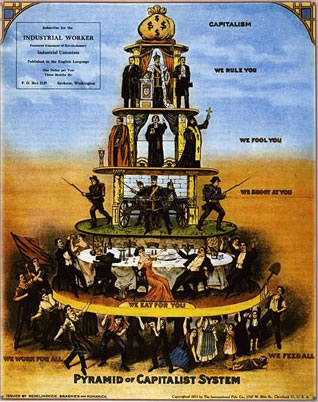 By Judith Gayle | Political Waves
By Judith Gayle | Political Waves
MOST OF US have heard the tale of the frog swimming in the pot -- as the water ever so slowly comes to a boil, the unaware frog adjusts to the rising temperature rather than jump out, ensuring its ultimate demise. That's an excellent analogy to how we got in this financial, as well as political, position today. It should be noted that many alternative voices, including Planet Waves, have been warning about the water beginning to bubble for years.
Finance isn't my forté, so I won't attempt to dissect our current struggles with a green visor on and a single light bulb dangling over my head. I don't crunch numbers, I weave words. I think the larger picture of how we got here will suffice to show how the hand that began to turn up the heat, back in the Reagan years, knew exactly what it was doing.
When Richard Nixon decided that health care needed to be put on the for-profit track, he enthusiastically backed the newly emerged
Kaiser Permanente model as an early HMO prototype and the wave of the future.
When Ronald Reagan put on his "Sunny Jim" persona and told us that regulation of business and services was holding us back from achieving a new iteration of the "shining city on a hill," we took his word for it. When George Bush first propped his cowboy boots on the desk in the Oval Office, one of his first visitors was
Kenny Lay, his Enron buddy who perpetrated fraud in deregulated energy trading. Shortly after, Dick Cheney had the Big Oil boys over for a private, and still secret, chat.
Trust me, said Dick Nixon. Trust me, said Ronald Reagan. Trust me, said George Bush. Each time the conservatives asked us to trust them we did: even as their corporate agenda became clearer and more obvious. What was stealth in the 70s, a PR pitch in the 80s and picked up steam under Bill Clinton became a clear and present danger in the Bush regime.
"The great enemy of the truth is very often not the lie -- deliberate, contrived and dishonest -- but the myth -- persistent, persuasive and unrealistic," said John F. Kennedy. Thinking people everywhere know that JFK's warning was neither heeded nor anticipated, and we have the scars to prove it. The years since he uttered that statement have brought us layers of complexity and social division that are amazing to behold.
In JFK's day, credit cards were issued by individual businesses to purchase their own goods. High-end homes could be had for around $30,000. These days, that's the price of a car. Everything has become financed; there's very little "cash and carry" in this nation. Some stores even refused, not so long ago, to take cash; I think they'd take it now.
In today's economy, the average debt for the American family is roughly
$8,565 (not counting its national debt load from the Iraq war and Wall Street give-away) and startlingly modest starter homes cannot be purchased for less than $100,000, although that figure is slipping every day.
The persistent mythology of having to give our children more than we had, an American mantra, has taken a heavy toll; and few of us have asked the essential question: what IS more? More stuff? More fun? More ease? No matter what they try to sell us, surely we know by now that money doesn't define the essentials. How about more love? More character building? More balance? When we take shortcuts to achieve goals, it’s more likely the outcome will be superficial. If that’s not what we want for our kids and grandkids; then why -- oh, why -- did we create that for ourselves?
We unsuspecting frogs snapped up that easy moneyfly that buzzed around our heads, which is one of the reasons we've become too bloated to make an easy leap out of the pot. When Buddhist teacher
Thich Nhat Hanh came to Congress to discuss "mindful consumption" in all things with its members, he might as well have been talking in his native Vietnamese. America could have it all!
We believed the mythology of "ownership society" and "exceptionalism;" we lost our ability to select common sense over the common wisdom of the day. Even after it became apparent that Bush lied to the nation in blatant fashion, we still looked to his government to tell us the temperature of the water. We forgot all the lessons history taught us.
 |
Shankara, founder of Advaita Vedanta and commentator on the Upanishads. |
The Republican's use of Naomi Wolf's
chaos theory and Naomi Klein's
shock doctrine of disaster capitalism have taken us down a slippery slope, and now we're floating on the top of the churning water looking to see if we have a last jump in us.
If you listen to the talking heads in TV Land, the money thrown at our current economic problems are helping to stem the blood-letting; if you seek out financial whiz kids who aren't paid by corporate money, they will tell you that there appears no bottom to the black hole we're throwing our currency into, and they're not sure when it will appear. The money mavens, enjoying no oversight whatsoever, have overplayed the system to the point of tangle, and we can't get a grip on the snarl, let alone the tendrils that connect to every household in
the world -- not
nation, my dears, but
world.
I think of all things as grist for the mill; what churns out on a daily basis is what we use to create an intention for the next one. Hindu scriptures, the
Upanishads, tells us that there is infinite metaphysical organizing power in setting an intention:
You are what your deepest desire is.
As your desire is, so is your intention.
As your intention is, so is your will.
As your will is, so is your deed.
As your deed is, so is your destiny.
I don't think it's our destiny to boil, but that nice, warm bath we've been taking may well be over. It's time to become frogs again, instead of a sociopolitical experiment for those who want to see what happens if they turn up the heat. I believe it's our destiny to come back to our elemental nature, turn our back on our captors and discover the sheer joy of hopping in the company of others who have the freedom to do the same. Unless we want to become stew, that's what will have to happen next -- and it will take a bit of doing.
Months ago, when Clinton and Obama were battling for the nomination, I mentioned that we now had two establishment candidates running for the Democratic nod. For some, the establishment is a corrupt and deceitful business operation. Indeed, Noam Chomsky tells us that the United States is a
one-party system, and that party is "business," defined by capitalism and consumerism. You will hear echoes of that in the campaigns of Ron Paul and Ralph Nader; in my opinion, that's a pretty accurate assessment.
 |
An Industrial Workers of the World poster (1911). |
Corporatocracy is the philosophy of this government; one of the steps in achieving a fascist state is to combine corporate interests with government and religious influence. I think that would be more evident to us if we weren't so compliant with the system; so willing to take everything they say at face value, so disbelieving that they've made us into frogs. The government doesn't need a big stick if the population is kept desperate for whatever carrot its being offered. After 9/11 we were told to shop; now there's no money to shop with, we find the bag of carrots we're tempted with is empty. Can we leap out of the pot now?
This establishment system we're in has all but played out; it was never our friend. I've read a number of articles telling me capitalism is dead, but I don't believe that. Capitalism is not the enemy, if it's ethical and subject to reasonable law; but there's plenty wrong with what it's become, and with the mind-set of those who push it, a bit hysterically, as a national religion. Notice that the election will turn on the economy; six months ago, it was the war. Self-interest is where we put our attention; commonwealth is where we need to put it, instead.
In terms of manifestation, energies are either working for us or against us. The government, as it's presently defined, is working against us. The "change" that both Obama and McCain speak of is a matter of tone and intention. Both candidates know how to work the system, or they wouldn't be in the public eye, spending millions to court our vote. While both tell us that system is broken, only one proposes a sweeping overhaul; the other is focused on Congressional earmarks, drilling options and school vouchers which is, in my opinion, the equivalent of a facelift.
Be warned: believing that there is a simple political fix for our national problems will put us back in the pot. The democratic process must be mended from the inside out if it is to survive a meltdown of this proportion; and it will require a level of civic responsibility we haven't been called upon to muster for decades. Be warned: believing that either is something they're not would, as this emergency eases, put us back in the pot.
We know where a McCain presidency would take us, so it's not worth repeating here.
Jon Stewart -- brilliantly, I might add -- gave us a look at Mac's last stand and "new" stump speech on Comedy Central. The candidate promised a brand new shift in his "change" rhetoric; the clip says it all: and obviously, which is what satire is meant to do. Financial policies under McCain's leadership gives us a handful of populist tactics to lull the voting public, and a strategy designed to complement the Bush years with continuing corporate influence.
Obama, on the other hand, has that common sense approach to which we've almost become tone-deaf; we've lost our appreciation for simplicity. The majority of Obama's economic policy changes wouldn't even need a
60 vote majority in the Congress, circumventing a partisan fight. His bottom-up solutions are aimed at the middle class, which is what must be kept sound if balance is to be achieved. The tone of his governing model speaks volumes to those of us who have witnessed, yet again and way too often, the Republican inability to effectively govern.
Mr. Obama is not a Boomer; he has
Pluto in hard-working Virgo, and he seems to delight in the structure of things. If we are, indeed, a government that is defined as a business, it would be a pertinent first step towards regaining our larger national aspirations to put someone in charge who sees the flaws in the system and has a pragmatic plan to change them. Surely, in these long years of Katrina, botched wars and economic disaster, a man who has created a water-tight, emotionally-sound and stunningly effective 18-month campaign has organizational talent we cannot ignore.
More, I believe Obama has an empathy totally missing in John McCain's psyche. Obama's background did not give him privilege, his history did not give him an easy road, and his future has always been in his own hands. Even playing by the Republican rulebook, he pulled himself up by his own bootstraps. His DNA has taught him how to bring people together in common purpose.
The only question we should have at this point is -- what is Obama's purpose? I believe it's more than the sum of its parts, much as is the man himself. Big money and big contributors have brought him to this place in time and space; I'd presume that if questioned on that, Obama would tell us that's just how the system works. I would also think that if he did not feel fully confident with his decisions, he would not have proposed a return to full transparency in government. Sometimes, it's the little clues that tell us the most.
At worst, given our choices today, Barack Obama would be an excellent CEO of AmeriCo. If we, as a nation and as a world, intend to leap out of the stew pot and land on a lily pad, we must put aside the convenient and appealing idea of short-cuts and easy fixes; some things aren't convenient.
The early hope that Obama could create a more equitable, progressive America has fallen back to a dawning realization of our new limitations, and hope that he can salvage enough of its basic structure to rebuild. Neither candidate can fully speak to the circumstances of the treasury by the time they take office; neither know, but they must suspect. Who they want to take care of first should be another clue as to where they'd take us next.
The New York Times tells us that there are
serious differences between the candidates' economic policies. Obama's populist touch is apparent in
the details -- and it's the details that define this young man, although we hunger for some of that soaring inspiration he sometimes offers. Even plain-speaking, uber-Left cartoonist and journalist
Ted Rall thinks Obama has the capacity to bend to meet the circumstances.
The most impressive quality that Obama has is that he is teachable. He's not a sound bite guy -- he's a nuance guy. It's apparent that he has the ability to learn quickly and adapt to challenges, yet not so quickly that he fails to take time to consider the long-range implications; and isn't that another thing we've all hungered for, after eight Bush years?
 |
Looking out the back kitchen window on a farm in Normandy, France. Photo by Danielle Voirin. |
Our circumstances are distressing, these days, and they could get worse but it's not the end of the world. It's paradigm-breaking energy, and perhaps the end of one set of circumstances that has worn us into a socioeconomic groove for so long we've forgotten there was any other way to live. If we let go of the win/lose concepts, it's just a bump in the road; life is what happens when we're busy making other plans.
Perhaps because of that, it's been my goal to live a life undefined by external circumstances. I've had good times, I've had bad times -- I go on. I've found that my happiness has not been defined by either; it's defined by what's happening inside me. Here's a Zen proverb I'll share with you that's served me well:
Before enlightenment; chop wood, carry water.
After enlightenment; chop wood, carry water.
After this election, and into the coming months of change, we will still be chopping and carrying. That's life. What is important to us will still be important; what isn't important will simply drop away.
Perhaps we won't have money for warring, anymore; perhaps we'll learn how to wage peace, instead. Perhaps we'll spend more time with our kids, instead of more money on them. Maybe we’ll learn how to take care of each other, instead of only ourselves. Maybe what is essential in life is awaiting our rediscovery; we knew what that was, once upon a time.
We make the leap now, silly frogs that we have been; and just in the nick of time. I'd like to think that the candidate who leads this nation in the new year will know how to roll up his sleeves and do the essential chop and carry work, just as we do. Can you imagine what it would be like to have a president that would work with us, perhaps for us, instead of against us? When I go to my heart, it's clear there's only one candidate that will.
As we set our intention, we cannot fail to usher in the changes that will create new opportunities and choices. In this time of dwindling safety nets, we face age-old fears of insecurity, but we've had lifetimes of doing that. None of this is new, it's just another turn in the road; we can choose to do it differently this time. If we set our intention toward creating something wonderful, rather than suffering something tragic, we will find the beauty and energy that will lead us forward. Intention is everything -- let's make it count.
By the way, Deepak Chopra is offering a
free six-week video web series on God-consciousness. It's available through the Unity Church on-line. I love it when businessmen, which Chopra obviously is, decide to give something away because it's badly needed. That is "compassionate capitalism;" I would like to see that become the new financial model for the 21st century. Chop wood, carry water -- and always, ALWAYS give some away.